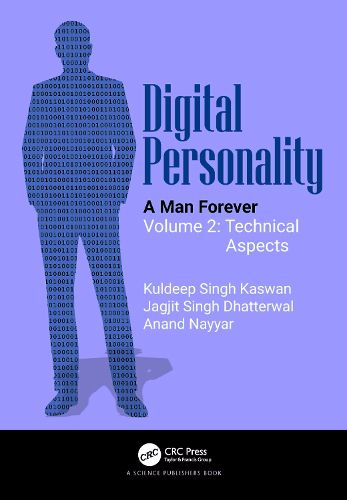Readings Newsletter
Become a Readings Member to make your shopping experience even easier.
Sign in or sign up for free!
You’re not far away from qualifying for FREE standard shipping within Australia
You’ve qualified for FREE standard shipping within Australia
The cart is loading…






A computer that imbibes human characteristics is considered to have a digital personality. The character is akin to real-life human with his/her distinguishing characteristics such as history, morality, beliefs, abilities, looks, and sociocultural embeddings. It also contains stable personality characteristics; fluctuating emotional, cognitive, SOAR technology, and motivational states. Digital Personality focuses on the creation of systems and interfaces that can observe, sense, predict, adapt to, affect, comprehend, or simulate the following: character based on behavior and situation, behavior based on character and situation, or situation based on character and behavior. Character sensing and profiling, character-aware adaptive systems, and artificial characters are the three primary subfields in digital personality.
Digital Personality has attracted the interest of academics from a wide range of disciplines, including psychology, human-computer interaction, and character modeling. It is expected to expand quickly as technology and computer systems become more and more intertwined into our daily lives. Digital Personality is expected to draw at least as much attention as Affective Computing. The goal of affective computing is to enable computers to comprehend both spoken and nonverbal messages from people, use implicit body language, gaze, speech tones, and facial expressions, etc. to infer the emotional state and then reply appropriately or even show affect through interaction modalities. More natural and seamless human-computer connection would be the larger objective. Users will benefit from a more individualized experience as a result. Additionally, this will affect how well the user performs since they will have the assistance of the robots to do their jobs quickly and effectively.
This book provides an overview of the character dimensions and how technology is aiding this area of study. It offers a fresh portrayal of character from several angles. It also discusses the applications of this new field of study.
$9.00 standard shipping within Australia
FREE standard shipping within Australia for orders over $100.00
Express & International shipping calculated at checkout
A computer that imbibes human characteristics is considered to have a digital personality. The character is akin to real-life human with his/her distinguishing characteristics such as history, morality, beliefs, abilities, looks, and sociocultural embeddings. It also contains stable personality characteristics; fluctuating emotional, cognitive, SOAR technology, and motivational states. Digital Personality focuses on the creation of systems and interfaces that can observe, sense, predict, adapt to, affect, comprehend, or simulate the following: character based on behavior and situation, behavior based on character and situation, or situation based on character and behavior. Character sensing and profiling, character-aware adaptive systems, and artificial characters are the three primary subfields in digital personality.
Digital Personality has attracted the interest of academics from a wide range of disciplines, including psychology, human-computer interaction, and character modeling. It is expected to expand quickly as technology and computer systems become more and more intertwined into our daily lives. Digital Personality is expected to draw at least as much attention as Affective Computing. The goal of affective computing is to enable computers to comprehend both spoken and nonverbal messages from people, use implicit body language, gaze, speech tones, and facial expressions, etc. to infer the emotional state and then reply appropriately or even show affect through interaction modalities. More natural and seamless human-computer connection would be the larger objective. Users will benefit from a more individualized experience as a result. Additionally, this will affect how well the user performs since they will have the assistance of the robots to do their jobs quickly and effectively.
This book provides an overview of the character dimensions and how technology is aiding this area of study. It offers a fresh portrayal of character from several angles. It also discusses the applications of this new field of study.